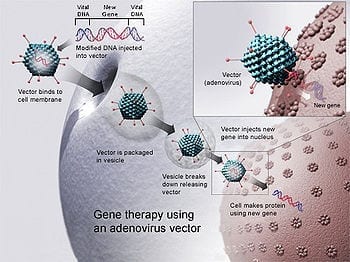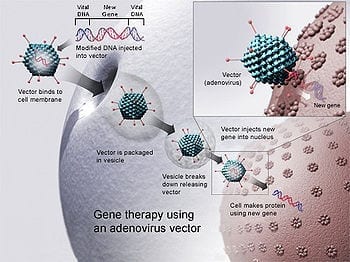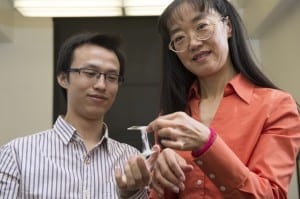
IT SOUNDS like science fiction, and for years it seemed as though it was just that: fiction.
But the idea of gene therapy—introducing copies of healthy genes into people who lack them, to treat disease—is at last looking as if it may become science fact.
The field got off to a bad start, with the widely reported death of an American liver patient in 1999. In 2003 some French children who were being treated with it for an immune-system problem called SCID developed leukaemia. Since then, though, things have improved. Indeed one procedure, for lipoprotein lipase deficiency (which causes high levels of blood fats, with all the problems those can bring), has been approved, in Europe, for clinical use.
The most recent success, announced last month in the Lancet, was of an experimental treatment for choroideremia, a type of blindness. This is caused by mutation of the gene for a protein called REP1. Without REP1, the eye’s light receptors degenerate. Robert MacLaren of Oxford University used a virus to deliver working versions of the REP1 gene to the most light-sensitive part of the retina. Five of the six participants in the trial duly experienced an improvement in their sensitivity to light. Two were so improved that they could read more letters than previously on a standard eye chart.
Dr MacLaren’s work complements that of Albert Maguire and Jean Bennett at the University of Pennsylvania, who use gene therapy to treat another eye disease, Leber’s congenital amaurosis. A defective version of a gene called RPE65 means that, in this condition, retinal cells are starved of vitamin A, which also causes blindness. Putting normal copies of RPE65 into the retina leads, as with REP1, to greater light sensitivity and—sometimes—clearer vision.
The Latest on: Gene therapy
[google_news title=”” keyword=”Gene therapy” num_posts=”10″ blurb_length=”0″ show_thumb=”left”]
via Google News
The Latest on: Gene therapy
- US Approves Gene Therapy Treatment For Hemophiliaon April 26, 2024 at 11:04 am
Pharmaceutical giant Pfizer has received US approval for a gene therapy against a form of hemophilia, a rare and inherited blood clotting disorder, the company said Friday.
- New gene therapy eliminates need for bone marrow transplant. Here's how it works.on April 18, 2024 at 8:08 pm
A young Long Island boy is the first in New York state to undergo a new gene therapy for a rare blood disease.
via Bing News











